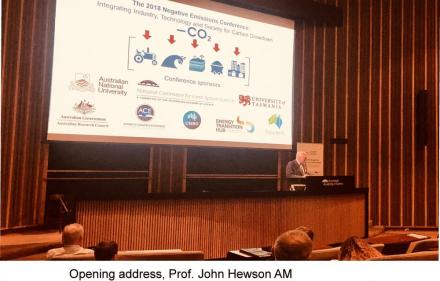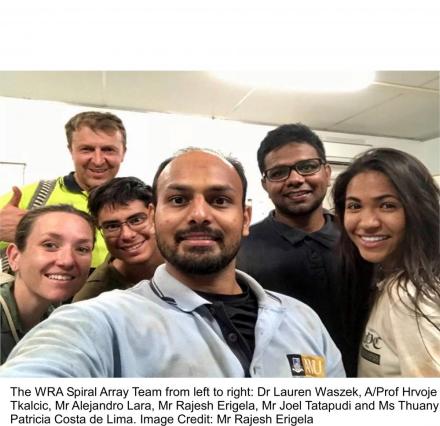|
Director's Message
Colleagues,
I have just been reading the article published in Science Advances by Stewart Fallon, Hannah James, Ian Williams and Rachel Wood with colleagues from Queensland. Unprecedented insights are revealed into the conditions under which Neanderthals lived in glacial Europe. Many of the findings in the paper have been enabled by analytical developments made and perfected in our School. You can download and read the paper at http://advances.sciencemag.org/content/4/10/eaau9483/tab-pdf
Kind regards,
Steve |
|
Neanderthal teeth reveal unexpected lead exposure
Researchers from Griffith University and RSES have used 250,000-year-old teeth of Neanderthal children to reconstruct the ancient climate of southeast France.
The discovery promises to open up a new field in the archaeological study of hominins.
RSES PhD student Hannah James, who was part of the study, said the teeth of the two Neanderthal children contained evidence of repeated exposure to high levels of lead, a metal known to have adverse effects on the development of the brain and nervous system.
READ MORE
|

|
|
Negative Emissions Conference 2018
Last week, ANU RSES together with UTAS, hosted The Negative Emissions Conference 2018, a two-day event to explore what negative emissions options are available or could be developed in coming decades. The conference brought together the humanities, arts, sciences and policy makers to work towards making sure Australia plays a leading role in negative emissions becoming a reality. The conference was well attended by researchers and policy makers with notable Australian and international speakers.
The topics presented ranged from natural and experimental solutions though to technological advances. Parallel to the scientific discussions was a focus on policy change.
A proposed follow-up event is planned in the first half of 2019 with a call to action to continue the conversation, engage and invite industry to future events and seek funding.
Thank you to the conference sponsors, ANU, UTAS, Australian Academy of Science, CSIRO, ARC, Energy Transition Hub, ACE and Future Earth Australia and the team at RSES in making this conference happen. |
|
|
Installation of Spiral-arm array of Seisometers in Warramunga

|
|
Seismology and Mathematical Geophysics Group installed a spiral-arm array of seismometers in Warramunga, Northern Territory as an effort under the scope of Dr Waszek's DECRA project and the group's research efforts on nuclear non-proliferation. On one hand, the data collected by these instruments will enhance our knowledge on the mantle discontinuities beneath Australia. On the other hand, a carefully designed spiral-arm array configuration and its simultaneous operation with the WRA array will provide valuable insights from the performance and monitoring/enhancement-of-weak-signals perspectives.
The array was installed by the Canberra team in cooperation with the WRA staff based in Tennant Creek, Mr Joel Tatapudi and Mr Rajesh Erigela. The array will be running continuously for approximately one year. |
|
|
Abstract for Cliff Thurber’s talk on 3rd December 2018
A major field project was carried out in March 2016 at the Brady geothermal field in west-central Nevada, as part of a Department of Energy project nicknamed PoroTomo. A vibroseis truck was used as a repeatable seismic source, and both nodal seismic instruments and a distributed acoustic sensing (DAS) system were deployed in the study area. The main goal of PoroTomo is to demonstrate the potential for developing a fine-scale model of the physical properties of a portion of the geothermal field, in this case the volume around the injection wells. The field work was scheduled to overlap the time period of a planned shut-down of the geothermal power plant for annual maintenance, allowing for detection of possible temporal change in the subsurface structure as fluid injection and extraction rates were varied.
My presentation will consist of three parts. First, I will present a brief comparison of data from the DAS system and the nodal array. After making corrections to convert DAS data from strain rate to ground velocity and convert geophone array data from ground velocity to strain rate, we find excellent agreement between the two data types for a regional earthquake. Next, I will show the results from a tomographic inversion of P-wave travel time data from the vibroseis source on a combined node and DAS dataset. Finally, I will present the results of the analysis of earthquake activity that occurred during the 2016 plant shutdown and other shutdown periods before and since 2016. We find clear evidence that cessation of fluid pumping triggers earthquakes at Brady.
Clifford Thurber, University of Wisconsin-Madison |
|
The 20th Australian Organic Geochemistry Conference (AOGC) - Origins of oil, old organics and organisms

|
|
RSES in collaboration with Geoscience Australia, will host this year’s Australian Organic Geochemistry Conference (AOGC), to be held at the Finkel Theatre, John Curtin School of Medical Research, ANU from 3–7 December 2018.
Details about AOGC 2018, including information about how to register and submit abstracts, are now available on the conference website:
http://www.ga.gov.au/news-events/conferences/australian-organic-geochemistry-conference
|
|
|
|
|
|

|
|
Publications
Fordham, B. G., Aze, T., Haller, C., Zehady, A. K., Pearson, P. N., Ogg, J. G., & Wade, B. S. (2018) Future-proofing the Cenozoic macroperforate planktonic foraminifera phylogeny of Aze & others (2011)
Smith T M., Austin C., Green D R., Joannes-Boyau R., Bailey S., Dumitriu D., Fallon S., Grün R., James H F., Moncel M., Williams I S., Wood R., Arora M.(2018). Wintertime stress, nursing and lead exposure in Neanderthal Children (2018) |
|

|
|
ANU offers a range of counselling services for enrolled students (undergraduate or postgraduate) who might be experiencing a range of difficulties around mental health, stress, motivation, social anxiety and so on. For more information, visit:
http://www.anu.edu.au/students/health-wellbeing/counselling
In addition to the group programs and workshops they also offer confidential counselling services for individuals. If you have concerns about the welfare of any of your students, please consider directing them towards this service. |
|
|
|